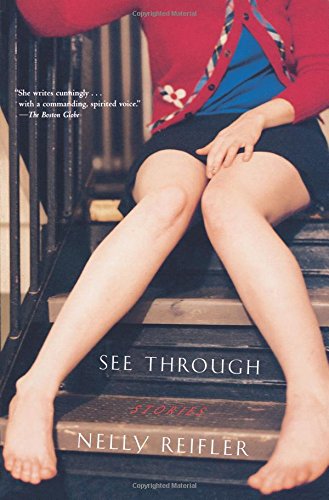Reifler's stories range from the traditional to the offbeat, from the scary to the mundane. It's when she's walking the line between that line of scary and mundane that she's at her best. Mystery--and more specifically the mystery behind our impulse toward violence--is the major motif of the early stories of this collection, which also are among the best.
"Teeny's" details I'll save for a separate review. It's definitely a story worth reading.
"Baby" tells the story of an extremely smart child who calls into question the mother's reason for living. We get the idea that the baby's philosophical dialogue lines are actually in the mom's head. But such does not stop her from reacting in the most horrible of manners.
"Rascal" revolves around a young man who motorbikes around the country, camping out and meeting new people. The idea seems innocent enough, until the rascal discovers that he can use the knife his mother once gave him to gather goods from other campers. While there may not be maliciousness intended, the rascal's inability to discern what the limits of acceptable behavior are is troubling.
The next three stories take a different turn, focusing on death and disease. “Julian” tells the tale of a boy whose father is dying and whose cousin comes to visit and makes explicit how scary that is. “Memoir” is about a village where the plague or some other disease has broken out and to which people fear to travel. The girl at the center of this tale has some strange sexual proclivities as well, which left me a bit befuddled, that combination of wasting away of doctors and townspeople while she's jumping the bones of random older men. “Splinter” is a more traditional piece, telling of a little girl who manages to get a thorn stuck in her head, while vacationing with her divorced father in Greece. The latter is befuddled as to what to do and angry that her mother has saddled him with the child precisely because of things like this. The stories climax involves a dwarf--not the kind of person one reads about often and certainly not, by the end, in such a matter-of-fact way.
“Upstream” puts the metaphor of the salmon swimming upstream to full use. It recounts the tale of a young boy watching his parents' marriage dissolve as his father continues to have various deliances with his college students. The boy becomes fascinated by monsters but also by fish, a memory of his last family vacation to the Northwest.
“The River and Una” also uses a fish metaphor but not with as much success. This story reminded me a bit of some of my own early or poorer work—melodramatic and full of expected troubles: an absent father, a runaway sister, a mom who can't deal with said sister, fights between them, and then a dying sister who has gone too far (or was pulled/pushed too far).
“North Curve” seemed a great set-up for a story but disappointed me in ending too soon. I wanted to know more about this woman who grows up to work as a prostitute near where the brothel where her father died. “Summer Job” is about a girl who works at a dirty magazine store owned by a relative for the summer and her phone conversations with a boy she's never met.
"Auditor" returns to the writing about the awkward and scary people on the edge, only in this case, the person has actually gone over the edge. The auditor is a woman who dislikes friendly people and who one day can't take it anymore. Her seeming regret for her action suggests that she has perhaps learned to mitigate her tendency to become annoyed.
Finally, the title story revolves around a woman who works at a porn shop. I'm not exactly sure what to call such places, but they are the locations where women perform/strip for customers behind glass. I liked how Reifler narrated this one, with accounts of the different men, but I wasn't sure, in the end, how the stories added up.
Friday, January 27, 2017
On "See Through" by Nelly Reifler ****
Labels:
Books,
Collections,
Four-Star Collections,
Nelly Reifler
Subscribe to:
Post Comments (Atom)







No comments:
Post a Comment